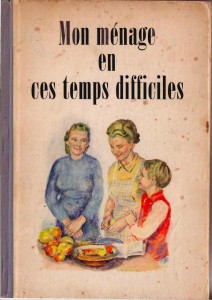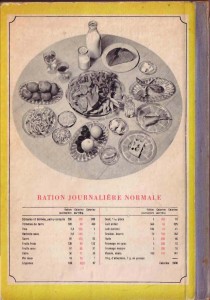 This little book, which I picked up in the Caritas thrift shop in Geneva years ago, suddenly seems relevant again. It was published in 1942 as a guide for housewives contending with shortages and rationing during World War II; my edition, which is clearly translated from German, was apparently a premium from the Compagnie Genevoise des Tramways Electriques.
This little book, which I picked up in the Caritas thrift shop in Geneva years ago, suddenly seems relevant again. It was published in 1942 as a guide for housewives contending with shortages and rationing during World War II; my edition, which is clearly translated from German, was apparently a premium from the Compagnie Genevoise des Tramways Electriques.
Switzerland was not a direct participant in World War II, of course, but as all the surrounding countries were at war, they experienced shortages and rationing just as their neighbors did. (Also, the Swiss have a bit of a bunker mentality—to this day, residents are required to keep certain food rations on hand at all times, more as a hedge against inflation than to ward off starvation.)
This little book actually packs quite a bit of information into a small space. The author, Madame Helen Guggenbuhl, includes instructions on how to can, dry, and pickle food, remake clothing to accomodate changing sizes as you lose weight, and make soap substitutes out of things like beef trimmings, potato peels, and ashes.
 The food section combines solid housekeeping advice with some uniquely Swiss suggestions. Since potatoes weren’t rationed but flour was, Mme. Guggenbuhl suggests using grated potatoes to replace some of the flour in baked goods and to thicken sauces. To conserve cooking fat, she recommends browning flour and other grains in a dry frying pan and making your roux without butter. Other parts will be very familiar to the modern reader: Soups! Salads! Use meat as a flavoring, not the centerpiece of your meal! The back cover of the book shows a day’s worth of rations; this being the Swiss, wine and hard cider are included and there are two types of cheese, low-fat and what I guess we would call fat-free. It looks pretty good until you realze that it’s heavy on the potatoes, and you only get 1/10 of an egg a day.
The food section combines solid housekeeping advice with some uniquely Swiss suggestions. Since potatoes weren’t rationed but flour was, Mme. Guggenbuhl suggests using grated potatoes to replace some of the flour in baked goods and to thicken sauces. To conserve cooking fat, she recommends browning flour and other grains in a dry frying pan and making your roux without butter. Other parts will be very familiar to the modern reader: Soups! Salads! Use meat as a flavoring, not the centerpiece of your meal! The back cover of the book shows a day’s worth of rations; this being the Swiss, wine and hard cider are included and there are two types of cheese, low-fat and what I guess we would call fat-free. It looks pretty good until you realze that it’s heavy on the potatoes, and you only get 1/10 of an egg a day.
The section on conserving heating fuel has a familiar look as well. Apparently the draft snake is not an entirely modern invention; Mme. Guggenbuhl recommends it and illustrates its use, and she also reminds people to install double-hung windows and keep clutter off the radiators.
The section on clothing, on the other hand, is like something from a history book, with information on how to do laundry the hard way (pre-soak, then boil everything in a big cauldron and hang it out to dry), how to chip the mud off hob-nail boots, and how to darn socks (alternate title: how to get blisters). Mme. G even explains how to set up a rain barrel in order to have soft water for washing.
MFK Fisher, who lived in Switzerland just before the war, did a much more entertaining take on this same topic in How to Cook a Wolf, which reads almost like a riposte to this little book. Maybe it was.
In happier times, Mme. Guggenbuhl also authored The Swiss Cookery Book: Recipes from all cantons. My copy, which I think I also picked up in that thrift shop, is a charming edition from 1954 with a very 1950s-style cover.
I went looking for information about Helen Guggenbuhl and ran across this obituary of her son, the psychologist and writer Adolf Guggenbuhl, who died just this year. Here’s what it said about Helen:
His mother came from a longstanding Zürich family in Maienfeld. During the pregnancy with Adolf she was studying medicine. Later she worked as an editor at the Schweizer Spiegel publishing company.
The picture painted by his obituary is of parents who were caught up in their professions at the expense of their children:
To his parent’s house, which was strongly marked by the profession of his parents, came writers like Kurt Guggenheim and Friederich Glauser and personalities like the physicist Wolfgang Pauli and the philosopher Hartmann. He told us that Glauser had told him especially fanciful bedtime stories.
Adolf Guggenbühl’s childhood was not easy for him. He spent the greatest part of it far away from home in children’s homes and sanatoriums. At home he was cared for by not always much loved housemaids since his parents were both busy with their professions.
From this bit of family history, it sounds like Mme. Guggenbuhl was more interested in writing about boiling laundry than actually doing it. Still, this little manual stands as a useful guide to the homely arts as well as an interesting sociological document.
Below is a link to the whole thing, for the curious. Two warnings: It’s big (10 MB) and it’s in French.
housekeeping-in-difficult-times
One thought on “Housekeeping in these difficult times”